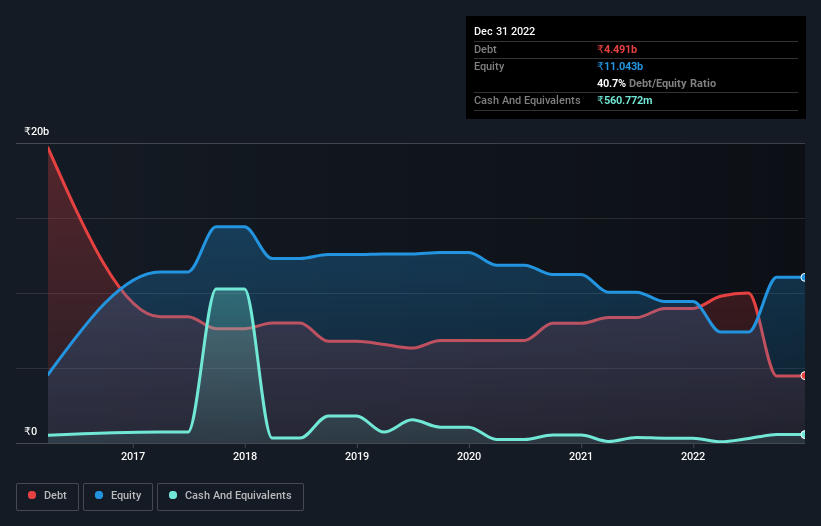
The external fund manager backed by Berkshire Hathaway's Charlie Munger, Li Lu, makes no bones about it when he says 'The biggest investment risk is not the volatility of prices, but whether you will suffer a permanent loss of capital.' When we think about how risky a company is, we always like to look at its use of debt, since debt overload can lead to ruin. As with many other companies SEPC Limited (NSE:SEPC) makes use of debt. But should shareholders be worried about its use of debt?
When Is Debt Dangerous?
Debt assists a business until the business has trouble paying it off, either with new capital or with free cash flow. Part and parcel of capitalism is the process of 'creative destruction' where failed businesses are mercilessly liquidated by their bankers. However, a more frequent (but still costly) occurrence is where a company must issue shares at bargain-basement prices, permanently diluting shareholders, just to shore up its balance sheet. Of course, plenty of companies use debt to fund growth, without any negative consequences. When we examine debt levels, we first consider both cash and debt levels, together.
View our latest analysis for SEPC
What Is SEPC's Net Debt?
The image below, which you can click on for greater detail, shows that SEPC had debt of ₹4.49b at the end of September 2022, a reduction from ₹8.97b over a year. However, it also had ₹560.8m in cash, and so its net debt is ₹3.93b.

How Strong Is SEPC's Balance Sheet?
According to the last reported balance sheet, SEPC had liabilities of ₹5.76b due within 12 months, and liabilities of ₹2.93b due beyond 12 months. On the other hand, it had cash of ₹560.8m and ₹9.73b worth of receivables due within a year. So it can boast ₹1.61b more liquid assets than total liabilities.
This short term liquidity is a sign that SEPC could probably pay off its debt with ease, as its balance sheet is far from stretched. The balance sheet is clearly the area to focus on when you are analysing debt. But it is SEPC's earnings that will influence how the balance sheet holds up in the future. So when considering debt, it's definitely worth looking at the earnings trend. Click here for an interactive snapshot.
Over 12 months, SEPC made a loss at the EBIT level, and saw its revenue drop to ₹3.3b, which is a fall of 21%. That makes us nervous, to say the least.
Caveat Emptor
While SEPC's falling revenue is about as heartwarming as a wet blanket, arguably its earnings before interest and tax (EBIT) loss is even less appealing. To be specific the EBIT loss came in at ₹852m. Looking on the brighter side, the business has adequate liquid assets, which give it time to grow and develop before its debt becomes a near-term issue. But a profit would do more to inspire us to research the business more closely. This one is a bit too risky for our liking. When analysing debt levels, the balance sheet is the obvious place to start. But ultimately, every company can contain risks that exist outside of the balance sheet. For example, we've discovered 3 warning signs for SEPC (2 are a bit unpleasant!) that you should be aware of before investing here.
If, after all that, you're more interested in a fast growing company with a rock-solid balance sheet, then check out our list of net cash growth stocks without delay.
New: Manage All Your Stock Portfolios in One Place
We've created the ultimate portfolio companion for stock investors, and it's free.
• Connect an unlimited number of Portfolios and see your total in one currency
• Be alerted to new Warning Signs or Risks via email or mobile
• Track the Fair Value of your stocks
Have feedback on this article? Concerned about the content? Get in touch with us directly. Alternatively, email editorial-team (at) simplywallst.com.
This article by Simply Wall St is general in nature. We provide commentary based on historical data and analyst forecasts only using an unbiased methodology and our articles are not intended to be financial advice. It does not constitute a recommendation to buy or sell any stock, and does not take account of your objectives, or your financial situation. We aim to bring you long-term focused analysis driven by fundamental data. Note that our analysis may not factor in the latest price-sensitive company announcements or qualitative material. Simply Wall St has no position in any stocks mentioned.
About NSEI:SEPC
SEPC
Provides integrated design, engineering, procurement, construction, and project management services in India and internationally.
Adequate balance sheet with acceptable track record.
Similar Companies
Market Insights
Community Narratives



